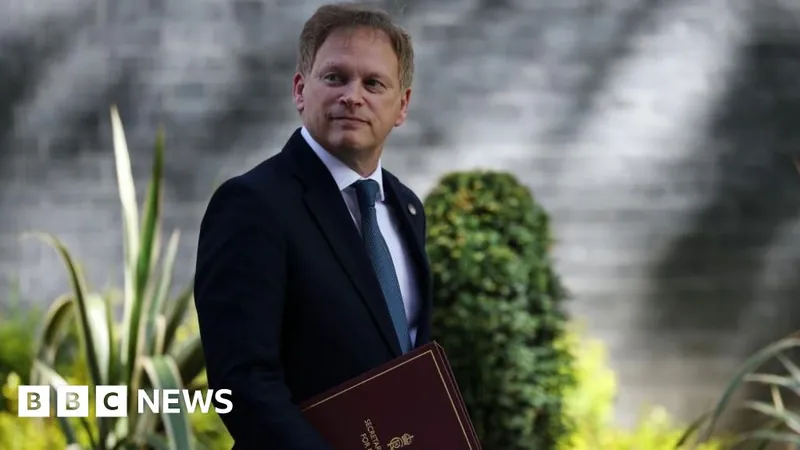
Data Breach Dilemma: Sir Grant Shapps Emphasizes Saving Lives Over Transparency
2025-07-18
Author: Wai
In a dramatic turn of events, former Defence Secretary Sir Grant Shapps has addressed the controversial decision to conceal a significant data breach that revealed confidential details concerning thousands of Afghans and British officials.
In his first interview since the incident came to light, Shapps asserted that prioritizing life-saving measures was the only appropriate response to the crisis. He stated, "Erring on the side of caution was entirely justified," stressing that his main concern was to address the fallout and protect vulnerable individuals.
The High Stakes of Disclosure
The situation became critical as the Taliban sought revenge against those who had assisted the British government during the war, with many individuals facing potential harm or death. Sir Grant defended the injunction that prevented the breach's details from being disclosed, echoing the sentiments of his predecessor. He argued that the judicial order was essential to shield lives in jeopardy.
Recently, a "super-injunction"—which kept the very existence of the breach under wraps—was lifted, sparking a media frenzy. This occurred after Shapps took office in August 2023, shortly after the breach was discovered and legal actions were initiated to suppress its details.
Reflections on the Response
In a candid moment on BBC Radio 4’s Today programme, Shapps stated, "If the revelation of this list could lead to individuals being hunted down or executed, I stand by my decision to maintain the gag order." He conveyed disappointment that the order had lingered longer than expected, believing it should have been reconsidered as risks diminished.
Shapps faced questions regarding the Intelligence and Security Committee's lack of awareness about the breach. He explained that concerns regarding information leaks made discussions about who should be informed particularly delicate.
The Breach's Far-Reaching Implications
In February 2022, nearly 19,000 Afghans who had worked with the UK were inadvertently exposed, along with the identities of over 100 Britons, including spies and special forces. Although subsequent injunctions were placed to protect specific identities, these were also recently lifted, revealing the full extent of the breach.
Criticism arose from the Liberal Democrats, who accused current Defence Secretary John Healey of misleading Parliament when he claimed no serving military personnel were at risk following the leak. However, Downing Street defended his statements, insisting on the utmost security for UK forces.
A Covert Rescue Operation
Amidst the chaos, the government secretly launched the Afghanistan Response Route (ARR), a resettlement scheme designed for those affected by the breach and their families. This initiative has successfully relocated over 4,500 Afghans to the UK, with expectations of 2,400 more in the pipeline, at a cost near £850 million.
Despite the ongoing fears expressed by relatives of those named in the leak, the Taliban claimed it had not acted against the affected Afghans. Still, individuals within Afghanistan reported alarming increases in Taliban efforts to track down relatives mentioned in the exposed data.
As Sir Grant Shapps grapples with the repercussions of this data breach, the shadow of uncertainty looms large over the safety of many, highlighting the complex balance between transparency and life preservation in times of crises.



 Brasil (PT)
Brasil (PT)
 Canada (EN)
Canada (EN)
 Chile (ES)
Chile (ES)
 Česko (CS)
Česko (CS)
 대한민국 (KO)
대한민국 (KO)
 España (ES)
España (ES)
 France (FR)
France (FR)
 Hong Kong (EN)
Hong Kong (EN)
 Italia (IT)
Italia (IT)
 日本 (JA)
日本 (JA)
 Magyarország (HU)
Magyarország (HU)
 Norge (NO)
Norge (NO)
 Polska (PL)
Polska (PL)
 Schweiz (DE)
Schweiz (DE)
 Singapore (EN)
Singapore (EN)
 Sverige (SV)
Sverige (SV)
 Suomi (FI)
Suomi (FI)
 Türkiye (TR)
Türkiye (TR)
 الإمارات العربية المتحدة (AR)
الإمارات العربية المتحدة (AR)